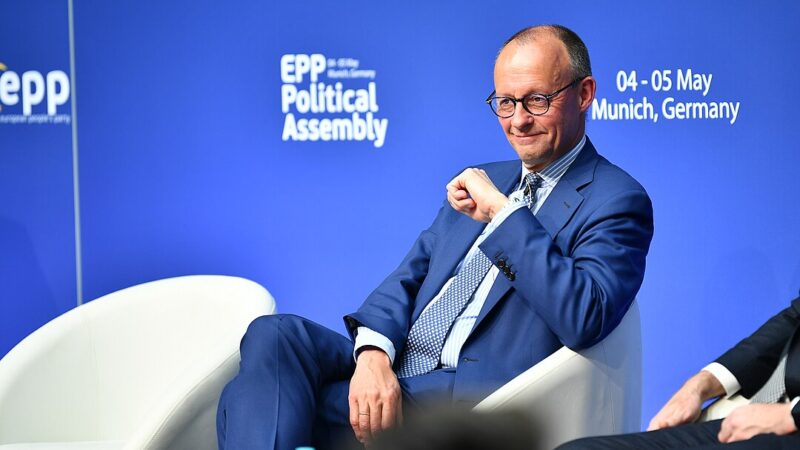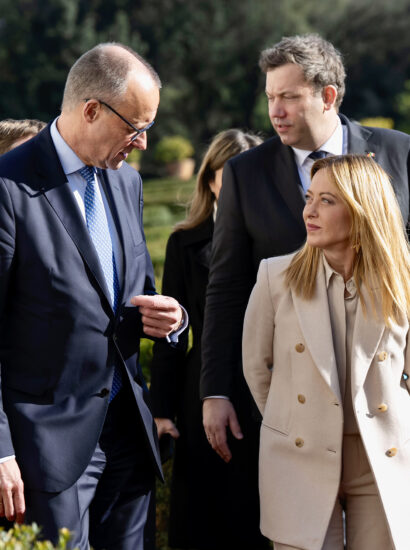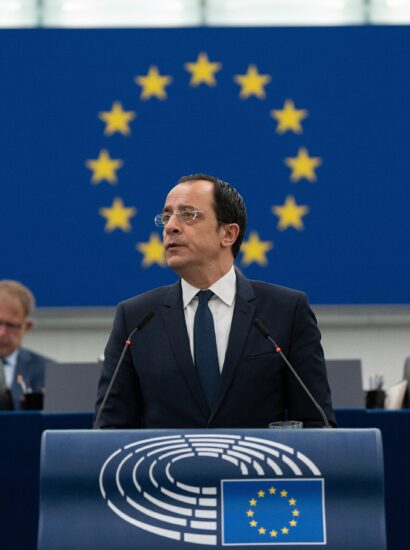The snap elections in Germany on Sunday saw record-breaking turnouts and a move to the right.
The conservative parties were able to turn the high degree of public discontent into votes. On the other hand, the voters clearly punished the parties of the “traffic light coalition” led by Federal Chancellor Olaf Scholz. The far-right Alternative for Germany (AfD) came in second, followed by the Christian Democratic Union (CDU) and its Bavarian sister party, the Christian Social Union (CSU) (together known as the Union Parties). It’s interesting that the election estimates were within a hair’s breadth of being perfect, but no one can truly be happy about that. First and foremost, the Free Democrats and the Alliance Sahra Wagenknecht fell short of the five percent threshold.
These are our five takeaways from Germany’s most engaged election since 1990.
It’s Better Not to Govern Than to Govern Poorly
The oldest party in Germany, the Social Democratic Party (SPD), had its worst national election outcome in well over a century. Chancellor Olaf Scholz declared following the results that he would not be serving in any capacity in the upcoming administration. The SPD will likely stay in power despite the significant loss, but this will only likely extend its unavoidable misery.
It is expected that the SPD’s leaders will accept a right-wing refugee policy from the CDU/CSU for another term in office, and they will likely seek welfare measures in exchange; they will have to make a number of sacrifices on social and green policy.
The largest loser of the evening was the fiscally conservative Free Democratic Party (FDP), which was led by former Finance Minister Christian Lindner. The party dropped seven percent from its 2021 result and plummeted out of the Bundestag, falling below the five percent barrier required to enter parliament. The majority of these voters switched to the AfD (about 900,000) and Union parties (1.350 million). Since taking power in 2013, Christian Lindner has returned his party to its previous location: outside parliament. The temptation was too strong, but the party shouldn’t have ever joined the Scholz coalition as a right-wing party with two etatist parties. Lindner declared he would step away from “active politics” once the outcome was known.
Three percentage points separated the once-rising Greens from the previous national parliamentary election.
Voters shifted primarily to The Left Party and some to the Union parties as a result of high energy costs and unhappiness with Economy Minister Robert Habeck’s policies.
The Greens are unlikely to be included in the next administration since Merz is expected to look for cooperation with the SPD. Since they will agree with the CDU/CSU-led administration on many topics, like as the harsher border and asylum policy, it will be challenging for them to identify a stance in opposition. This implies that the future government’s one issue is to set itself apart from the others, which is probably going to be efforts to slow down climate change.
A Winner (And a Loser): The CDU/CSU
Despite winning the election, CDU/CSU’s share was well below the target of 30 percent, which made it more difficult for them to get their agenda through coalition talks. Despite the fact that the overall result would indicate a majority for a right-wing program, this will not be possible due to the firewall that has been put up in front of the AfD: as their leaders promised last night, culturally and economically disparate parties must form a government by Easter at the latest.
Markus Söder’s distinctively right-wing ideas helped the CSU in Bavaria achieve a comparatively better outcome than the Union parties. The CSU nonetheless won one more election district than the AfD in all of East Germany, just in this particular state.
Merz is probably going to form with the SPD, the already well-known Grand Coalition, which will expose his conservatives to AfD attacks.
The East-West Divide that Makes the AfD Great Again
If the current trend continues, the AfD will win the election because they doubled their 2021 result. Disenchanted supporters were moved by the party’s unrelenting emphasis on immigration, economic complaints, and pro-Russia stances, especially in the East, where it has solidified its place as the most powerful party. Alice Weidel, the AfD’s candidate for chancellor, described it as an “historic success.”
“We will hound the others to make sensible policies for our country,” she said, adding she was open to participating in a coalition government with the conservatives — something that Merz has ruled out.
Here’s what our @YouGov MRP of Germany’s 299 constituencies (@MattChorley!) is suggesting will happen in February’s snap general election.
A blue AfD wave rides across from the east, while a black CDU/CSU tide sweeps up from the south.
Huge consequences for German politics. pic.twitter.com/5r3WHsq25l
— Patrick English (@PME_Politics) January 17, 2025
But the great electoral success also brings with it some pretty big challenges for the parliamentary group executive in the Bundestag. Suddenly, twice as many MPs have to be managed as before – including many unknowns. And some who are described as “problem bears”.
Like Maximilian Krah, nicknamed “Schampus Max” or “Champagne Max”, who is ending his interlude in the European Parliament and is now moving into the Bundestag. What role will he play?
In East Germany, the AfD garnered more votes than the three parties that made the formerly traffic light coalition combined. In Saxony they have almost doubled the CDU’s share of the vote, in Saxony, there were districts where the AfD had almost 50 percent of the vote. Based on their current results in the East German “Länder”, which are slightly under 40 percent, they could form a government with an absolute majority in Saxony-Anhalt and Mecklenburg-Western Pomerania after the 2026 state elections. Even the CSU has not been able to perform like this well for some time in Bavaria.
Additionally, this indicates that the AfD is becoming the party for the Ossis (an informal name for the former citizens of East Germany). Despite the far-right party having managed to gain more than 10.3 million votes nationally (CDU obtained just above 14 million), only a couple of Western constituencies were able to win. However, in order to be in government, the party now needs to moderate, as two-thirds of Germans do not want to hear about the AfD governing.
Revival on the extreme (L)left
Despite dwindling support in recent years, The Left party has also had success in eastern Germany. The Socialist Unity Party, which controlled East Germany until its reunification in 1990 and had closer ties to the country’s elder citizens, gave rise to The Left.
“It’s incredible how much energy is unleashed when we clarify our positions and focus clearly,” said Ines Schwerdtner, one of the party’s national leaders. “There’s a sense of momentum throughout the party.”
Thanks to a massive increase in support from young people who were incensed about the emergence of the far right, The Left was able to enter the Bundestag.
On the other hand, the Sahra Wagenknecht Alliance (BSW), a populist-left, lost by the smallest margin. After Sahra Wagenknecht’s exit, everyone buried the far left, which had barely even broken three percent in the previous year’s EP elections. Then came Friedrich Merz, who accepted the AfD’s parliamentary votes in January. The Left gained a new boost when Heidi Reichin, the party’s parliamentary speaker, called for barricades against fascism in his anti-refugee plans in the German parliament. Millions of TikTok users shared her videos, and hundreds of young people were eager to see “Heidi,” and the party kept expanding.
The internal struggle of the far left has been decided in favor of The Left: the social segment that is open to the far left is apparently not content with only social policy but also wants to see strident anti-fascism and radical pro-refugee policies.
Germany Wants to be the EU’s leader Once More
The CDU leader outlined three main goals for the next administration: protecting Germany’s industrial foundation, handling migration issues, and strengthening European defense in light of changing US foreign policy.
“My absolute priority will be to strengthen Europe as quickly as possible so that, step by step, we can really achieve independence from the USA,” Merz said in a television program just after the election result was announced.
“I never thought I would say something like this about Washington,” he added. Later on, he underlined that the Trump administration and Europe are more adversaries than allies.
Friedrich Merz, a fervent European politician, believes that the Trump challenge can only be avoided with closer European cooperation. “We must now quickly regain our ability to act so that we can do the right thing at home, so that we are once again present in Europe, so that the world can see that Germany is being governed reliably again.”







